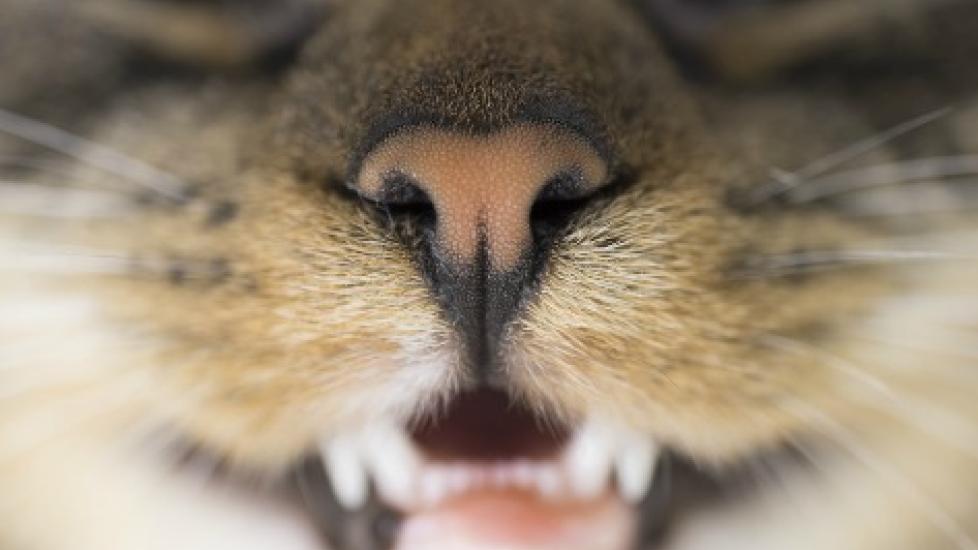Cat Teeth Grinding: What You Need to Know
By Stacia Friedman
Cats grind their teeth for many reasons. “It often occurs when a cat is in pain due to an underlying medical issue,” says Dr. Alexander M. Reiter, head of dentistry and oral surgery at University of Pennsylvania School of Veterinary Medicine.
Pet parents may notice cat teeth grinding as chattering or clicking sounds, or see their cat working his lower jaw from side to side.
Learn the causes of cat teeth grinding, treatment options and lifestyle changes you can make to keep your cat in optimum health.
Causes of Cat Teeth Grinding
Diseases of the oral cavity are often to blame when cats grind their teeth. Dr. Reiter says that the primary causes of feline tooth grinding include: tooth resorption (or disintegration), inflammatory gum disease, ulcers, cancer and abnormal alignment of the teeth.
“If your cat makes a chattering sound with its lower jaw, the problem could be feline tooth resorption, which causes severe pain,” says Dr. Reiter. “The bony substance of your cat’s teeth is called dentin. When tooth resorption occurs the dentin of one or more teeth erodes, eventually leading to breakage and possibly the loss of the entire tooth, including the root.” The cause of tooth resorption is not known and it affects almost 75 percent of cats over five years of age.
Besides tooth grinding, another sign of tooth resorption is loss of appetite. “Owners are usually the first to notice changes in their cat’s eating behavior. Your cat may be hungry and walk toward the bowl, but the food falls out of its mouth because it is in pain,” says Dr. Reiter. “Another sign of oral pain is drooling.”
When the lining (mucosa) of your cat’s mouth is inflamed by ulcers, swollen gums (gingivitis) or other inflammatory disease, the pain may lead to grinding of teeth.
Additionally, tooth alignment may be a cause of teeth grinding in cats. “Abnormal tooth alignment, also known as malocclusion, creates friction or grinding between the upper and lower teeth, especially in Persian cats,” says Dr. Reiter. “They are bred to have short faces which leads to teeth that out of alignment. The problem also occurs in some Siamese cats. Their long pointy faces may lead to upper canine teeth that point forward too much. We see this in young Siamese cats between five and eight months.”
“In other cats, we sometimes see fangs that appear longer than normal, also known as extrusion,” says Dr. Reiter, “As a result, the cat’s mouth has difficulty closing and this may cause grinding.”
Health problems outside the oral cavity can also lead to teeth grinding in cats. Abdominal diseases like pancreatitis, inflammatory bowel disease, cancer, and gastrointestinal ulcers can make cats essentially “grit their teeth” to get through the pain. Brain and behavioral disorders are other possible causes of feline teeth grinding.
Identifying Causes of Teeth Grinding in Cats
According to Dr. Reiter, 85 percent of oral diseases that cause grinding, including tumors, inflammation, ulcers and loose or broken teeth can be observed during a regular examination. “An X-ray or CT Scan may be needed to determine the cause, such as TMJ,” he says. TMJ is the name given to the joint where the lower jaw hinges to the skull. When this joint isn’t working properly, it can make a clicking or popping sound. Lab work, imaging (e.g., x-rays, ultrasound, MRIs), and tissue biopsies may be necessary to diagnose other causes of teeth grinding in cats.
Treatment for Cat Teeth Grinding
Because tooth grinding is often associated with pain, your veterinarian will need to create a treatment program that both relieves the pain and addresses the underlying medical issues.
“Cats have inflamed gums or gingivitis more than people,” says veterinarian Dr. Pamela Meuller of World of Animals in Philadelphia. “If left untreated, gum disease can lead to tooth loss.” Mueller says that the first step is a professional cleaning. When necessary, a problematic tooth may be extracted. “In some cases, a tooth may be saved by a restorative crown,” says Mueller.
Lifestyle Changes to Help Prevent Teeth Grinding in Cats
Dr. Mueller recommends brushing your cat’s teeth daily. Many cats also need an annual dental exam with a formal cleaning starting at the age of two. During the exam, your veterinarian will also be checking for tumors of the head, neck and mouth. Other lifestyle changes include speaking to your vet regarding a feline diet that promotes healthy teeth and gums.
Remember, if your cat grinds its teeth, he is likely experiencing pain and requires veterinary care.
Image: Henk Vrieselaar via Shutterstock
Health Tools
